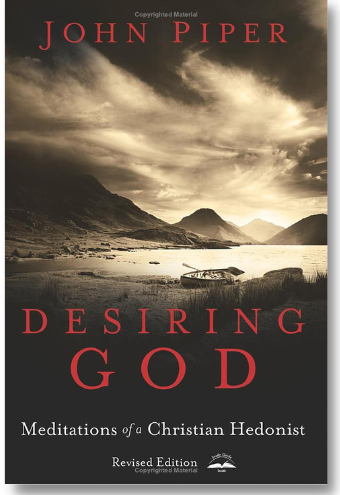I found myself in a conundrum a while ago. In short, I have big dreams to make a difference in people’s lives. Writing, teaching, counselling, discipling, and the list goes on. All of it would be for God of course.
But I had come to the realisation that nothing – not even my best efforts – could contribute anything to God or His plans. I am just a teeny tiny person on this massive planet. What was I to do with all my “big” dreams?
That’s when I came across John Piper’s book with its intriguing subtitle. Desiring God: Meditations of a Christian Hedonist. Hedonism – the pursuit of pleasure – is outright sin, isn’t it? I’ve even written about that here! But by the end of the first chapter I was astounded, convinced, and I wondered what more could be said in the rest of the 300+ page book. A lot, I discovered.
I read the book slowly. It’s meat, not milk. Piper understands something I am only just beginning to grasp. It’s not difficult to read, but some of the concepts are rather foreign, even contrary to what many of us have grown up believing. I’d describe them as almost too good to be true… but we serve a good God, so maybe they are so good that they must be true!
Christian Hedonism is an uncomfortable term, I understand. But allow me to introduce you to Piper’s insight, and you will see it is not unorthodox. Perhaps it will greatly expand your understanding of an abundant life here on earth, as it has mine. I’m confident that after reading this post you’ll at least give the concept some consideration.
Christian Hedonism
Let’s be clear: straight up hedonism is sin. We are not to be lovers of pleasure but to deny ourselves, take up our cross, and follow Jesus (2 Timothy 3:4, Mark 8:34). But although the love of pleasure is condemned in the New Testament, the Bible affirms pleasure itself.
By Christian Hedonism, Piper means, “no one is a Christian who does not embrace Jesus gladly as his most valued treasure, and then pursue the fullness of joy in Christ that honors Him.”
Piper makes a compelling case for pursuing our joy in God. God is sovereign and happy in Himself. What He values most is His glory (because, of course, that is what is “supremely valuable.”) When we seek and find our satisfaction in God, He is glorified. The two are one and the same. God’s pursuit of His glory in the form of praise from us is the same as our pursuit of pleasure in Him.
Chapter by Chapter
In each chapter, Piper demonstrates how God intends the pursuit of our joy and His glory in specific areas of life. My short paragraphs are only a teaser.
Worship
God commands us to praise Him – is that vain? Not when we realise that expressing praise is the natural culmination of our enjoyment and awe. “Delight is incomplete until it is expressed.” Look at that gorgeous sunset! Mmm, this is delicious. Since God is the source of infinite joy, it is right and satisfying for us to express our delight in Him.
Love
Piper shows how love and good deeds are not free from self interest, but that “our joy is doubled in another’s joy.” Our own joy is a valid motive for good deeds: We are to delight in being merciful, give cheerfully, and rejoice in truth. The Bible is full of promises of reward for good deeds, though deeds do not earn us salvation (Luke 6:35; Hebrews 11:26, 10:34, 12:2). The reward? To become like God, like one who loves. As Piper says, “Let the joy of edifying others free us from bondage to private pleasures.”
Scripture
Our level of joy is not fixed. We look to Scripture – the Word of God – to restore and revive the soul. The Christian Hedonist finds delight in the law; its statutes rejoice the heart (Psalm 1:1, 19:8, 119:16). George Müller said, “the first great and primary business to which I ought to attend every day was to have my soul happy in the Lord.” He sought this by reading and meditating on Scripture first thing each morning.
Prayer
Prayer is both the pursuit of God’s glory (John 14:13) and the pursuit of our joy (John 16:24). When we pray, we get the deliverance and God gets the glory. The pursuit of happiness in prayer is not self-centered. “It is radically God-centered. In my craving to be happy, I acknowledge that at the center of my life there is a gaping hole of emptiness without God… By grace I awake to the folly of my rebellion and see that if it is filled with God, my joy will be full.” Instead of us serving God, we allow Him to serve us. Through prayer we acknowledge that we are wholly dependent on Him, and we trust Him to be all-sufficient.
Money
Christians are not to seek money, but we are to seek a heavenly reward and lay up for ourselves treasures in heaven (Matthew 6:3-4, 19)! When God does prosper us on earth, it is so we can be a blessing to others. We can participate in bringing the gospel to unreached groups and food to many who are starving. “God increases our yield so that by giving we can prove that our yield is not our god.” We can be generous with our earthly possessions while looking forward to our heavenly reward.
Marriage
We pursue our joy in the joy of the beloved. No wife wants to receive roses on her anniversary because it’s the right thing for a husband to do. He buys roses because he loves her and he anticipates her joy, which brings him joy. The biblical pattern for marriage is based on the greater reality of Christ and the church. When a godly man leads and a godly wife supports his leadership, she “will no more be squelched by this leadership and support than the disciples were squelched by the leadership of Jesus.” Both husband and wife will thrive, their lives and relationship pointing the world to Christ and the Church.
Missions
If our understanding of missions is that duty calls for us to sacrifice much (perhaps with an attitude of self-pity) for the sake of spreading the gospel, then we have greatly misunderstood missions. David Livingstone, the pioneer missionary to Africa, declared he never made a sacrifice:
“Is that a sacrifice which brings its own blest reward in healthful activity, the consciousness of doing good, peace of mind, and a bright hope of a glorious destiny hereafter? Away … with such a thought! It is emphatically no sacrifice. Say rather it is a privilege.”
David Livingstone
Because salvation is God’s work and not humanly possible, “what the Christian Hedonist loves best is the experience of the sovereign grace of God filling him and overflowing for the good of others.” We love it when we can say, “not I, but the grace of God that is with me.”
Suffering
Suffering, whether by persecution or sickness, is “intended by Satan for the destruction of our faith and governed by God for the purifying of our faith.” But there is great joy to be found within suffering:
“The ‘intense joy’ comes from the sense that you have endured with the help of Christ. You have been proven in the fire and have come through as genuine. You did not recant. Christ is real in your life. He is for you the all-satisfying God He claims to be. This is what the apostles seemed to experience when, according to Acts 5:41, after being beaten, ‘they left the presence of the council, rejoicing that they were counted worthy to suffer dishonor for the name.’ The joy came from the thought that their faith was regarded by God as real and ready to be proved in the fire of affliction.”
John Piper, Desiring God, 285
The Christian Hedonist embraces “God’s universal purpose for all Christian suffering: more contentment in God and less satisfaction in self and in the world.”
In short, the Christian Hedonist pursues joy in every area of life. Not temporary, fleeting, earthly indulgences, but the joy of heavenly rewards and lasting satisfaction in God. This is abundant life.
What I appreciate
Piper has thoughtfully included every Scripture that may support or seem to contradict Christian Hedonism. Many of these I have read countless times, but with his careful unpacking, my heart leaped many times as I gained his insights.
The Bible is full of promises of rewards. God rewards those who diligently seek Him. In His presence is fullness of joy. At His right hand are pleasures forever more. Only since reading Desiring God have I contemplated the implications of these rewards for our time on earth. Now that I’ve finished the book, I am ready to start over again, but this time I’ll buy my own copy so I can underline and mark all over it.
My conundrum is resolved. I am ready to pursue wholeheartedly the dreams and desires God has put on my heart, and to find my satisfaction in Him as I bring glory to Him. We serve a good God who delights to satisfy us!
But that’s enough from me. I’ll let Piper address your objections.





